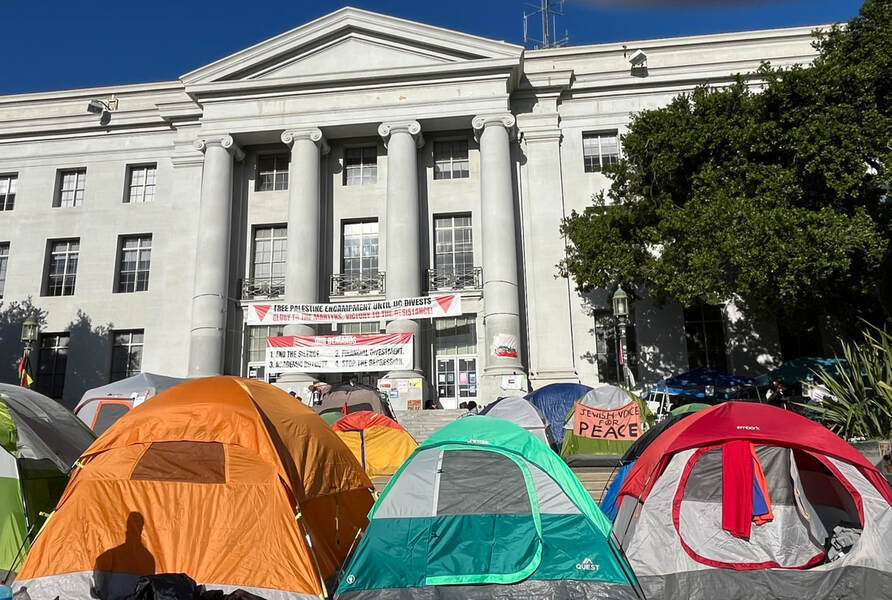|
By Felicia Gustin “Each generation must, out of relative obscurity, discover its mission, fulfill it, or betray it.” –Frantz Fanon (1925 - 1961), philosopher, revolutionary, author, and pre-eminent thinker on the issue of decolonization I was 20 years old when our fledgling anti-war group at Fullerton Junior College got the news - the National Guard had fired on protestors at Kent State University in Ohio, killing four students and wounding nine others. Within days, we held a protest and teach-in on our campus, as did students at hundreds at colleges and universities across the country. The Kent State killings, on May 4, 1970, ignited student outrage and intensified our efforts to end the war in Vietnam. At the time, mainstream society and media mostly condemned us. They said we were naïve in the face of a complex situation. Some called us Communist dupes and anti-American; others claimed this was the work of outside agitators. Sound familiar? Today’s Palestine solidarity movement, with protest encampments on dozens of campuses — and growing every day — is hearing similar accusations. The head of the Anti-Defamation League (ADL), Jonathan Greenblatt, called protest organizers from Students for Justice in Palestine and Jewish Voice for Peace “campus proxies” for the government of Iran. U.S. House Speaker Mike Johnson suggested the National Guard might need to be brought in to quell the protests at Columbia, asserting they had grown violent. “What’s happening in America’s college campuses is horrific,” Israeli Prime Minister Benjamin Netanyahu said in a televised statement. “Antisemitic mobs have taken over leading universities.” Netanyahu’s charge is echoed by right wing U.S. politicians whose current witch hunt in Congress around antisemitism in higher education is outright dangerous and cynical. The conflation of antisemitism with criticizing the government of Israel detracts attention from the main source of antisemitism in this country — right wing, white supremacists. The student movement against the war in Vietnam helped shift public opinion that eventually led to the U.S. withdrawal. Will this student movement meet similar success? We already see support growing, spreading like wildfire to other campuses here and abroad. Faculty members have spoken out against Columbia University and other college administrations for their militarized reaction to the protests. Thousands of people on and off campuses have challenged the notion that riot police, violence, mass arrests, evictions, and suspensions are valid responses to students’ constitutional rights to free speech and peaceful assembly. Yet these students continue to stand strong in the face of this brutality, calling for an end to the genocide, pointing to the mounting civilian death toll in Gaza, especially among children. Students have denounced the bombardment of all of Gaza’s twelve universities and hundreds of schools, the destruction of hospitals, homes, and infrastructure, the killing of journalists and health care workers, and the continuing blockade of humanitarian aid. Students are demanding that Washington ends its billions of dollars in weapons and military assistance that is enabling all this carnage. Students also want their campuses to cease investments in companies and institutions that fuel Israel’s violations of human rights and international law. The call for divestment is reminiscent of demands made by the student movement against apartheid in South Africa in the late 1970s and ‘80s. Though the divestment campaign had been underway for years, Washington and U.S. corporations had resisted. Student anti-apartheid activists then set their sights on their own colleges and universities. Campus divestment campaigns surged alongside protests, teach-ins, and student “shanty towns,” similar to the encampments we’re seeing today. One by one, under this massive pressure, campus after campus voted to divest millions of dollars from companies doing business in South Africa. From the student lunch counter sit-ins during the Civil Rights movement to the student movements to end the Vietnam War and apartheid in South Africa; from student protests to win Ethnic Studies and campaigns for university divestment from fossil fuels; from massive marches against police killings of Black people to solidarity with the Standing Rock water protectors – we have witnessed how students have always made a difference by uplifting the values of equity and justice. History has shown us that student mobilizations not only can shift public opinion and bring attention to what may seem like insurmountable causes, they also inspire hope. And nowhere is this more evident than across Gaza. All across social media, I began seeing photos and videos of Palestinian children and adults holding up signs and writing messages: “Thank you American Universities, your voice has reached Gaza.” “Thinking about the brave university students that are standing up for the Palestinian people’s right to exist and survive, we appreciate you and salute you.” And on the sides of the tents of displaced Palestinians in Rafah—currently facing an imminent military assault by Israel—there are dozens of spray-painted messages thanking students at Columbia and other campuses for their continuing movement to stop the war of genocide in Gaza: “Thank you, American universities. Thank you students in solidarity with Gaza. Your message has arrived.” And this banner, carried by a group of women: “The students give us hope.”
Comments are closed.
|
Find articles
All
Browse by date
July 2024
MEDIUM |
© COPYRIGHT 2017-2024 SURJ BAY AREA. ALL RIGHTS RESERVED.



 RSS Feed
RSS Feed